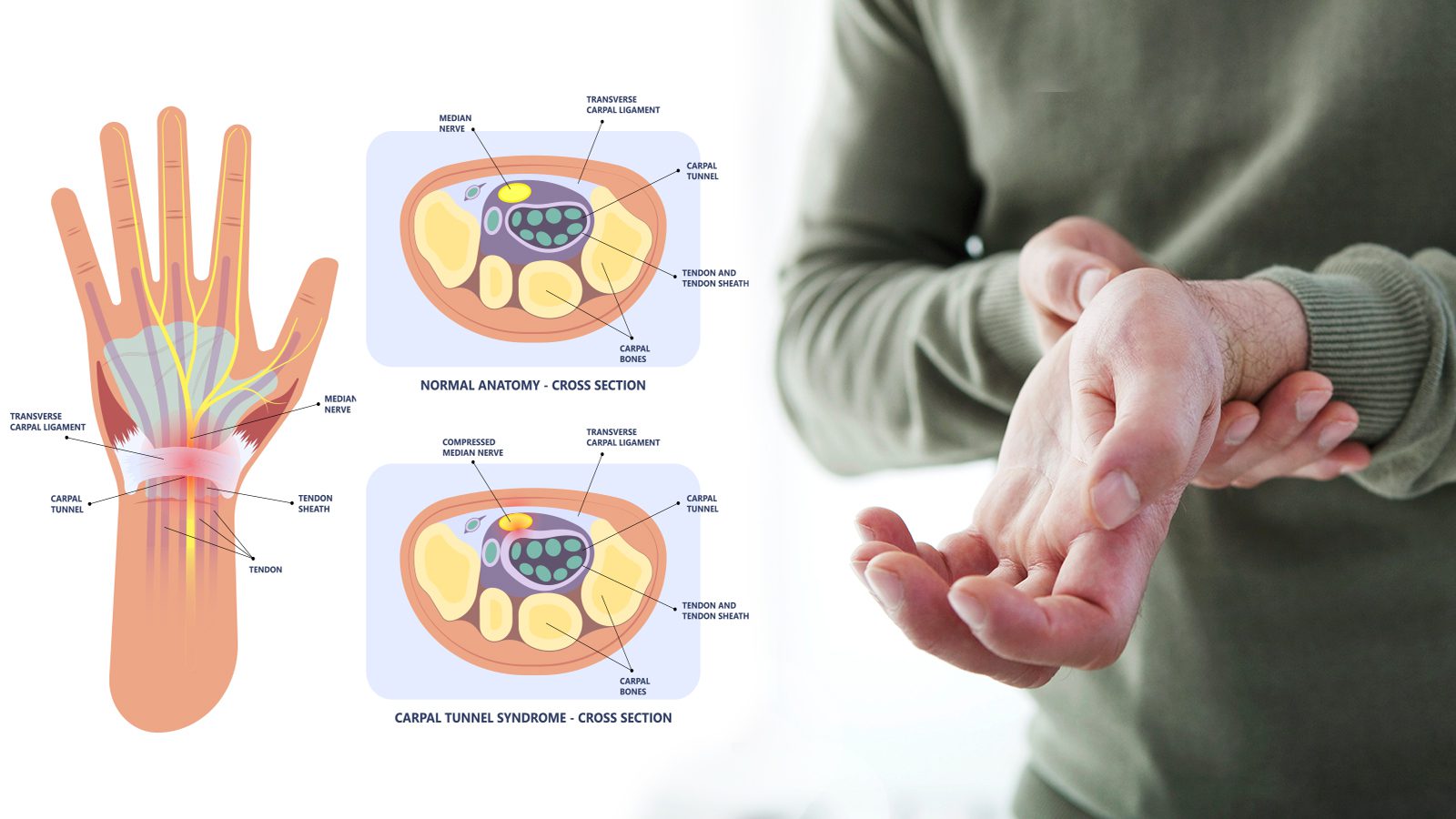Do you have numbness, tingling, or weakness that causes you to drop things due to your hands and wrists? You may have carpal tunnel syndrome. This condition is commonly found in women but can also occur (less frequently) in men. Fortunately, you can get relief by doing wrist exercises.
The median nerve runs through the wrists and up into your arm. When the nerve is compressed by doing repetitive movements, it causes uncomfortable sensations. Anyone who works with their hands is susceptible, but it’s common among people who type or make repetitive motions that cause compression in this area.
While there have been many studies on this common ailment, there’s still no definitive cause. According to the National Library of Medicine, more than eight million people in this country are affected. Additionally, they state that it’s the most common nerve issue, accounting for ninety percent of all neuropathies diagnosed yearly.
When it comes to risk factors, they’re so diverse that it’s nearly impossible to prevent them. Experts identify a vital component between lifestyle and genetic factors but can’t rule out specific medical issues either. The symptoms vary depending on the degree of compression, so the amount of pressure on the nerve will dictate your symptoms. The good news is that wrist exercises can bring relief.
Six Excellent Wrist Exercises for Carpal Tunnel Syndrome

Some physicians feel the best treatment for carpal tunnel syndrome is surgical intervention, but there are more natural methods for those who want to avoid the knife. While you can’t prevent this compression from occurring, you can be proactive to reduce the chance of experiencing symptoms. Here are six of the best wrist exercises to bring relief.
1. Wrist Flexor Stretch
This stretch is commonly used among athletes in warmups, so it’s perfect for a typist or anyone with a significant compression issue. Doing it a few times daily can help to take the pressure off that nerve.
1. Start by standing up straight and extending an arm forward. The other arm should be at your side.
2. Next, turn your palm facing upwards and bend your hand backward. If you do this correctly, the palm side should feel the stretching.
3. To deepen the stretch and work that compression, take your other hand, and help it to pull back this hand even more.
4. Strive to hold this pose for thirty to sixty seconds but stop if you feel any pain.
5. You want to do two to four reps on the one hand, and then you should switch and do the other.
2. Prayer Stretch
No, you’re not praying, but it’s not a bad idea. Use this familiar pose for spiritual practices to get your carpal tunnel in check. Here’s how to do it.
1. Stand or sit comfortably. Place your hands together like you’re in prayer mode, and make sure they are positioned right under your chin.
2. Slowly push your hands and direct them towards the waist area. You should feel some resistance and stretching sensations if you’re doing this correctly. If you feel pain in these movements, stop and try something else.
3. Strive to hold the pose for thirty to fifty seconds.
4. You should repeat this exercise two to four times a session.
3. Wrist Extensor Stretch
If you know that you will be doing activities that will provoke the nerves in your wrist, this is one of the great wrist exercises to help prevent pain while working. Did you know that constantly picking up your phone and scrolling can cause problems with these nerves? Yes, smartphone injuries are becoming more commonplace.
The less you aggravate the carpal tunnel, the fewer symptoms you’ll experience. This is the exact opposite of the flexor stretch.
1. Stand or sit in a comfortable position. Stretch your right arm in front of you, and make sure your palm is facing downward.
2. Bend the hand so that it’s facing toward the ground, and if you’re doing this right, you will feel stretching in the back of your wrist area.
3. Like in the flexor stretch, you should use your opposite hand to intensify the stretch.
4. Hold the position for thirty to sixty seconds.
5. Strive to do two to four repetitions on the right and then switch to the left.
4. Hand Push Ups
Who knew that you could do push-ups with your hands? It turns out that it’s a very effective form of wrist exercise that can benefit your carpal tunnel syndrome. This exercise stretches the palmar fascia and can quickly be done at work or home. Here’s how to do it.
1. Being by putting your hands together in a prayer pose.
2. Point your fingers down towards the floor.
3. Slowly spread apart your fingers and use your fingers to push your palm away from the pose. If done correctly, the prayer pose will only be held by your fingers being joined.
4. Bring the fingers back together and the palm back to the traditional prayer pose.
5. Strive to do ten to fifteen repetitions or as much as you can comfortably do.

5. The Shake
If you’re looking for easy wrist exercises that bring fast relief, then the shake will help you out. Have you ever felt pins and needles shaking your foot to bring relief? The medical term for this is paresthesia.
Your nerves send electric impulses from your spine to your extremities. These sensations give you the feelings you experience. When a nerve is compressed or has pressure, it’s like putting up a roadblock and closing the street.
The electrical impulses that flow and give you the sensation of touch are disrupted. So, it causes paresthesia, which is known as pins and needles. Using wrist exercises like the shake helps to release the compression and allow the electric impulses to flow. Here’s how to do the shake.
1. Take your left hand and shake it vigorously for one to two minutes.
2. Now, switch and do your right hand.
3. Of the wrist exercises listed, you must do this several times a day. Keeping the pressure off the carpal tunnel will reduce the feelings of pins and needles.
6. Median Nerve Glide
Before doing these wrist exercises, you will need either a heating pad or something that will apply heat to the affected area. You should warm up the region for around ten to fifteen minutes. After you warm it up, you want to cool it down with an ice pack.
Ice the area for another ten to fifteen minutes. Hot/cold therapy is necessary because it helps prevent swelling while exercising and works the medial nerve. As you go through each step of these tasks, you must hold them for five to seven seconds each.
Apply heat to your hand and wrist for fifteen minutes before doing this stretch. After, use an ice pack for twenty minutes. This will help prevent swelling.
1. Begin by making a tight fist with both hands and holding it for five to seven seconds.
2. Release the fist and extend your fingers outward. Make sure your thumb is resting tightly beside the other fingers. Hold the pose for five to seven seconds.
3. Bend your hand backward towards your upper arm and hold this for five to seven seconds. Just move your hands and try not to move your forearm with it. You will feel some burning in these nerves and muscles the first time you do it, but you must try to keep going.
4. While holding the position with your hands, move your thumb away from your fingers and extend it towards the side. Hold this for five to seven seconds.
5. Now, slowly rotate your hand in this position so your palm faces upwards. Be forewarned that you will feel a lot of stretching when you do this, which is why hot-cold therapy beforehand is essential.
Final Thoughts on Carpal Tunnel Exercises
If you have carpal tunnel syndrome, it’s best to see what degree of compression you’re dealing with in your wrists. Exercise can help relieve some pain but will not eradicate compression. Other remedies people use are wrist splints, frequent breaks from repetitive activities, hot/cold therapy, and injections.
Doing wrist exercises and other movements is part of developing a healthy routine for your body. While there are six exercises listed here, you don’t have to limit yourself to these few, as there are many more you can incorporate. When you’re working and moving these tender areas, you’re increasing your movement, circulation, and mobility of your wrists.
Lastly, it would help if you were cautious when doing these maneuvers, as it will be tender working areas that are often inflamed and tender. It’s only natural for you to feel some pulling and cramping as you move regions unaccustomed to these movements, but you should stop if you feel any sharp or stabbing pains.
Stabbing pains indicate that something is wrong, and a doctor must evaluate you to ensure the safety of continuing such exercises. However, most people find that doing these maneuvers a few times a day can be life-changing in the battle against carpel tunnel syndrome.


















